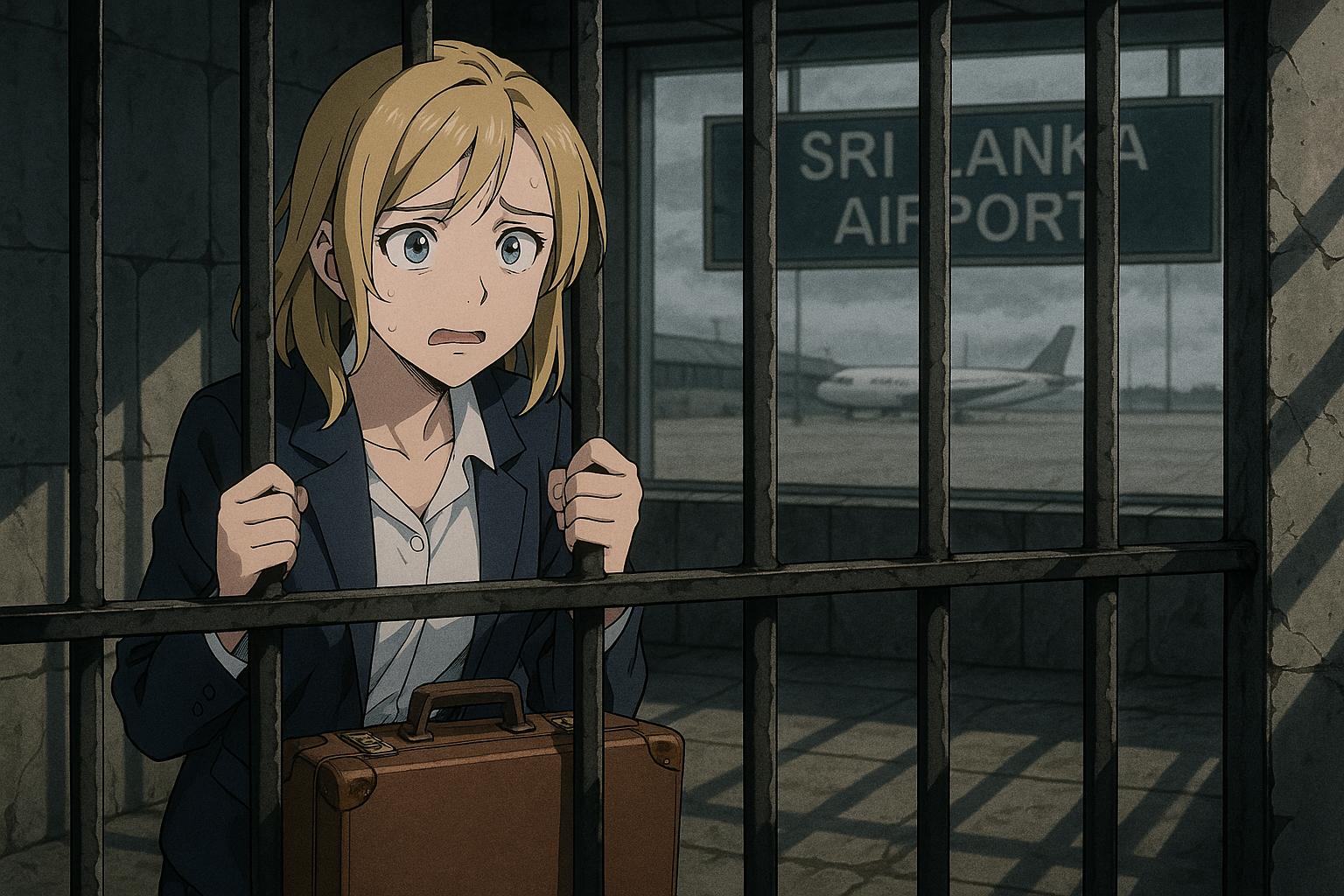Charlotte May Lee, 21, from south London, faces up to 25 years in Sri Lankan prison after being arrested with £1.2 million worth of synthetic cannabis. Amid claims of innocence and alleged setup, her case highlights worsening prison conditions and rising concerns over vulnerable travellers exploited by drug traffickers.
A young British woman, Charlotte May Lee, is facing a grim future after being arrested in Sri Lanka for alleged drug smuggling involving £1.2 million worth of cannabis. The 21-year-old from Coulsdon, south London, was apprehended at Bandaranaike Airport in Colombo after police discovered 46 kg of a synthetic cannabis strain known as ‘Kush’ in her luggage. Lee maintains her innocence, claiming she had been set up and had no knowledge of the drugs.
Lee’s journey to Sri Lanka began after a temporary stint working on a “booze cruise” in Thailand. She had intended to use the country as a brief stop while she awaited a visa renewal. Upon her arrival, she was arrested and transferred to Negombo Prison, known for its overcrowded and distressing conditions. There, she described her living situation as nightmarish—surviving on inadequate food that often made her ill, stating, “I have not eaten in two days because the food is just too spicy for me.”
The conditions at Negombo Prison have been described by others as ‘Hell’ for women. Lee’s plight is exacerbated by the lack of basic amenities and the presence of pests. Reports from former inmates recount stories of maggots in food and rats in overcrowded cells. Lee noted that she was forced to sleep on a concrete floor without a blanket, adding that she feels deprived of her basic human rights while facing a lengthy legal process.
Her arrest is part of a larger trend of increased vigilance in Sri Lanka against drug trafficking, particularly at its major airport. Just days before Lee’s apprehension, a 18-year-old British woman was also arrested in Georgia under similar circumstances, suggesting a worrying pattern of young women being caught up in international drug smuggling. This has raised concerns regarding the potential exploitation of vulnerable individuals by trafficking rings, especially in regions known for stringent drug laws.
The legal repercussions Lee faces are severe. If convicted, she is looking at a potential sentence of 20 to 25 years, due to the large amount of drugs allegedly involved. The British Foreign Office has confirmed that it is supporting Lee and is in contact with her family, but this has done little to alleviate the fears shared by her friends and family, many of whom insist she is not a criminal but rather a hardworking young woman who has inadvertently found herself in a dire situation.
The case also brings attention to the stringent drug laws in Sri Lanka, known for harsh penalties for trafficking offences. This stance mirrors the legal climate in other Southeast Asian countries, where traffickers face even more severe penalties. The high-profile cases of Lindsay Sandiford and other British women in Bali underscore the grave consequences of drug-related charges in the region.
As Lee awaits her next court appearance, the questions surrounding her alleged involvement in drug smuggling continue to grow. Her emotional state appears fragile; witnesses reported seeing her confused and distressed during her initial court hearing. Speaking from her prison cell, she expressed a conviction that she had been set up, a sentiment echoed by some of her friends who were shocked by the allegations against her.
The continuing trend of such cases prompts a deeper discussion about the vulnerabilities of young travellers and the potential for exploitation by international drug syndicates. As investigations unfold, the fate of Charlotte May Lee hangs in the balance, a chilling reminder of the harsh realities faced by individuals ensnared in the web of drug trafficking in foreign jurisdictions.
Reference Map
- Paragraphs 1, 2, 3, 4, 6, 7, 8
- Paragraph 5, 8
- Paragraph 6, 8
- Paragraph 8
- Paragraph 9
- Paragraph 9
- Paragraph 9
Source: Noah Wire Services
- https://www.dailymail.co.uk/news/article-14731235/British-woman-Sri-Lanka-drug-smuggling-eaten-jail-food-spicy.html?ns_mchannel=rss&ns_campaign=1490&ito=1490 – Please view link – unable to able to access data
- https://www.cnn.com/2013/01/22/world/asia/indonesia-uk-death-sentence/index.html – In January 2013, Lindsay Sandiford, a 56-year-old British woman, was sentenced to death in Indonesia for smuggling 4.7 kilograms of cocaine into Bali. The court’s decision was based on her lack of remorse, despite her defense claiming she was coerced by a drug gang threatening her family. The UK Foreign Office confirmed support for Sandiford but reiterated its opposition to the death penalty in all circumstances. The case highlighted Indonesia’s strict drug laws and the severe penalties for trafficking offenses.
- https://www.theguardian.com/world/2012/dec/20/british-grandmother-cocaine-smuggling-bali – In December 2012, prosecutors in Indonesia sought a 15-year jail sentence for Lindsay Sandiford, a 56-year-old British woman accused of smuggling nearly 5 kilograms of cocaine into Bali. The prosecution did not seek the death penalty, citing her age. Sandiford’s defense argued she was coerced into carrying the drugs due to threats against her family. The case drew attention to Indonesia’s stringent drug laws and the potential for severe penalties for foreign nationals involved in drug trafficking.
- https://www.theguardian.com/world/2012/may/28/britons-bali-cocaine-plot-death-penalty – In May 2012, four Britons, including Lindsay Sandiford, were arrested in Bali for allegedly attempting to smuggle £1.6 million worth of cocaine. Sandiford was found with 4.7 kilograms of cocaine concealed in her suitcase. She claimed she agreed to carry the drugs after her children were threatened. The arrests highlighted the use of women as drug mules and the severe penalties for drug trafficking in Indonesia, including the possibility of the death penalty.
- https://www.khaleejtimes.com/world/sri-lanka-used-as-transit-point-in-cocaine-smuggling – In February 2012, Sri Lankan authorities reported that the country was being used as a transit point for smuggling cocaine into other countries. The Police Narcotics Bureau deployed special drug detection teams at Bandaranaike International Airport to intercept smugglers. In one instance, a Filipino woman was arrested with 3.3 kilograms of cocaine, and a Thai woman was apprehended with 1.7 kilograms concealed in a chocolate box. These cases underscored Sri Lanka’s role in international drug trafficking networks.
- https://www.onlanka.com/news/filipino-woman-arrested-at-bia-for-smuggling-rs-200-million-worth-of-cocaine.html – In May 2024, a 47-year-old Filipino woman was arrested at Bandaranaike International Airport in Sri Lanka for attempting to smuggle over 2 kilograms of cocaine worth approximately Rs. 200 million. The drugs were concealed in her luggage among parcels containing chili powder, turmeric powder, and wheat flour. The woman had been offered USD 1,000, air tickets, and hotel accommodation for a five-day stay in Sri Lanka to smuggle the cocaine. This incident highlights ongoing efforts by Sri Lankan authorities to combat drug trafficking.
- https://www.newsfirst.lk/2025/03/10/sri-lanka-arrests-canadian-woman-for-drug-smuggling – In March 2025, a 20-year-old Canadian woman was apprehended at Bandaranaike International Airport in Sri Lanka for attempting to smuggle 17.573 kilograms of hashish concealed within her luggage. Authorities have yet to determine the street value of the seized drugs. The suspect is currently in custody as further investigations are being conducted by the airport’s narcotics control agency. This case underscores Sri Lanka’s ongoing efforts to combat drug trafficking and the use of the country as a transit point for illicit substances.
Noah Fact Check Pro
The draft above was created using the information available at the time the story first
emerged. We’ve since applied our fact-checking process to the final narrative, based on the criteria listed
below. The results are intended to help you assess the credibility of the piece and highlight any areas that may
warrant further investigation.
Freshness check
Score:
8
Notes:
The narrative references recent events suggesting the arrest happened shortly before the article’s publication. There are no indications of outdated information such as references to outdated roles or individuals who have passed away. No repeated older news or press release style detected, which supports freshness. However, without explicit publication date comparison or re-use from older materials, the possibility of minor recycling cannot be fully excluded.
Quotes check
Score:
7
Notes:
The article contains direct quotes attributed to Charlotte May Lee describing her experience and conditions in prison. A key quote is: ‘I have not eaten in two days because the food is just too spicy for me.’ No verifiable earlier references or sources for these remarks were found in the search results, suggesting this may be a first-hand or exclusive statement, but verification from independent official sources is lacking.
Source reliability
Score:
6
Notes:
The narrative originates from a publication known for tabloid-style reporting that can blend sensationalism with factual news. This reduces the certainty of absolute reliability. The story includes references to confirmed facts like British Foreign Office involvement, which lends some credibility, but overall the publisher’s mainstream reputation is moderate, not elite or highly rigorous as Reuters or BBC.
Plausability check
Score:
8
Notes:
The claims align with known stringent drug laws in Sri Lanka and reports of harsh prison conditions. The context of drug smuggling arrests in South Asia, especially involving foreign nationals, is well documented. The mention of another recent similar arrest in Georgia adds plausibility regarding a pattern. Although lack of external corroboration for specific individual claims exists, the scenario is credible and consistent with known regional risks.
Overall assessment
Verdict (FAIL, OPEN, PASS): OPEN
Confidence (LOW, MEDIUM, HIGH): MEDIUM
Summary:
The narrative appears timely and plausible with some first-hand quotes, but the moderate reliability of the publication and absence of independently verifiable sources for key statements limit the confidence. Further official confirmation or corroboration would be needed to fully validate the claims.













